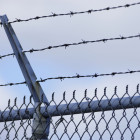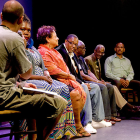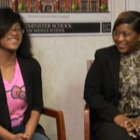
Sesame Street Workshop Helps Kids with Incarcerated Parents
|
As he grew up, Kharon Benson became accustomed to his father’s absence. But, when he was 10 years old, his mother handed him a letter and revealed a family secret.
Juvenile Justice Information Exchange (https://jjie.org/tag/parenting/page/2/)

As he grew up, Kharon Benson became accustomed to his father’s absence. But, when he was 10 years old, his mother handed him a letter and revealed a family secret.

Jaime has spent a year behind bars at Kewanee, where, at 14, he is the youngest inmate, and he has yet to be assessed by the prison, his mother says. Without an assessment he cannot receive more than the most basic therapy, and according to his mother, Jaime is not doing well.

What started as a “Kickstarter-type” project quickly developed into New York City’s first ever film festival based solely on the topic of fatherhood.

The Fatherhood Image Film Festival explores the complexities of being a father and positive male role model.

Grace Bauer had her entire world turned upside down when her son entered one of the nation’s harshest juvenile justice systems. Fueled by a burning desire to alter the system, she soon became one of the nation’s most impassioned crusaders for sweeping juvenile justice reform. Editor Note: This story is a continuation of the series Mental Health and the Juvenile Justice System: Progress, Problems and Paradoxes. Readers may also be interested in visiting the Juvenile Justice Resource HUB for more information about mental health and the juvenile justice system. --
The death of Grace Bauer's mother in 1998 triggered a cycle of grief that fully consumed her life for the better part of 15 years. “It became the mark we would measure time by,” she said. The pain, she said, was especially severe for her eldest child, Corey, who was 11 when his grandmother died.

For a parent of a black child, specifically a black male child, this trial pulled the scab off of painful memories...Black, young and male in America means you will not get a break.

Back in the fall of 2011, kids bullied Alycin Mabry so severely that her mom decided to home school the Atlanta 14-year-old. At the time, her mom Annise Mabry saw homeschooling as the shining answer the family needed. But today, Mabry says, it’s clear that their struggle was far from over. “Maybe two or three months into the online school, Ali started to become more and more isolated,” Mabry said. “I just couldn’t get her out of the room.

In 2001, my 13-year-old son, Corey, was sent to what the New York Times called “the worst juvenile prison in the country.”
What crime had he committed that earned him this hellish journey to the Tallulah Correctional Center for Youth in Louisiana? He stole a $300 stereo out of pick up after he smashed out the window with a crowbar. His sentence was five years in one of the most brutal facilities in the United States. The families of children who are system involved are often thought of as lazy, uneducated, uncaring or worse. But a new report by Justice for Families (J4F) gives us a much different picture of families and relies on substantial data rather than outdated myths and stereotypes.

Every day, nearly 50,000 children are forced to spend the night away from their families because of their involvement in the juvenile justice system, according to a new report. It’s not as if these youth have no one to care for them. Families of young detainees care deeply about their children, but often feel helpless when their children get into trouble -- especially in the face of high adult incarceration rates, zero-tolerance school policies and reduced social services, which can make it difficult for families to offer support. Add to this a juvenile court system that practically shuts out family members from receiving or offering input, and the feelings of frustration and helplessness multiply. These are the findings of Families Unlocking Futures: Solutions to the Crisis in Juvenile Justice, a report released Monday that offers a blueprint for reforms that involve family members at every step when a child gets into trouble, whether at school or in the juvenile justice system.

For the first time, Facebook is considering allowing children under 13 to join the social networking site, according to a story in The Wall Street Journal. But a study last year by the Pew Internet & American Life Project found Facebook is already full of children younger than 13. According to the report, 46 percent of 12-year-olds are already using Facebook despite the prohibition, either with their parents’ permission or by lying about their age. The Wall Street Journal reports Facebook is researching policies and new technologies that will keep young children safe while using the page. Possibilities include giving parents control over their child’s account by linking the parent and child accounts together.